‘I'm A Virgo’ Has A Lot Of Big Ideas — But Only Some Of Them Work
- Oops!Something went wrong.Please try again later.
- Oops!Something went wrong.Please try again later.
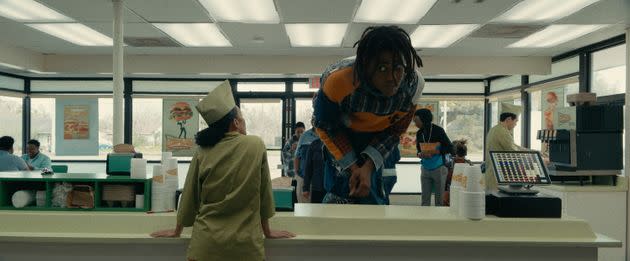
Creator Boots Riley bites off more than he can chew in "I'm a Virgo," starring Jharrel Jerome as a 13-foot tall young Black man.
There’s always a thrilling aspect to Boots Riley’s work. The writer-director has only helmed one movie, 2018’s “Sorry to Bother You,” but it introduced filmgoers to his brand of storytelling that is at once peculiar, ambitious, enraged, penetrating and loud. Kind of like if Charlie Kaufman and Public Enemy’s styles were pureed together, if you can imagine that.
“Sorry” also piercingly underscored what has long been a thorn in Riley’s side, even before he fronted the socially conscious hip-hop group The Coup decades ago: capitalism. Riley has had an unyielding compulsion to speak out against capitalism as the social justice enemy it is in an attempt to obliterate it and galvanize enough people to do the same.
“All we’re taught is that those who are rich deserve to be rich because they worked harder than the rest of us or they’re smarter,” the filmmaker told The New York Times in a 2018 interview. “And this may be true of some of those folks, but there are definitely very poor people who are very smart and work hard. It’s just that this system can only have a few people on the top.”
You see a lot of this frustration once again in his latest offering, “I’m a Virgo.” But it’s muddled in a series that is about so many things, it ends up being about nothing at all.
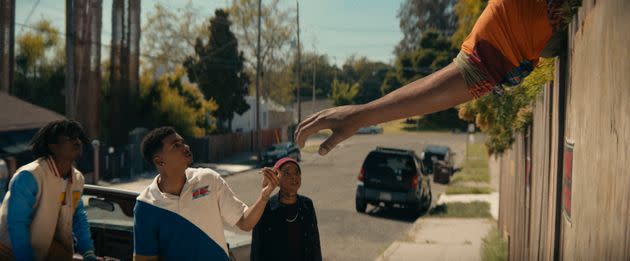
"I'm a Virgo" begins as a fascinating coming-of-age story before it loses its way.
Riley collaborates with co-showrunner Tze Chun (whose work includes directing an episode of “Little America”) on the Prime Video series he created, which has an otherwise simple premise: a 13-foot Black teen comes of age in America.
Well, I guess, “simple” coming from the same mind that brought us half-human, half-horse workers in “Sorry to Bother You.” So, take from that what you will.
But “I’m a Virgo” is rooted in something familiar, even as it shows us the extraordinary. Jharrel Jerome, who astounded in 2019’s “When They See Us,” takes on double duty as both star and co-executive producer, bringing to life a young Black man named Cootie whose appearance has meant he’s had to be protected from the harsh outside world.
Cootie’s parents, LaFrancine (Carmen Ejogo) and Martisse (Mike Epps), have always sheltered him inside their home and away from the judgmental eyes of those who would only ever see him as a spectacle, someone to laugh at or exploit.
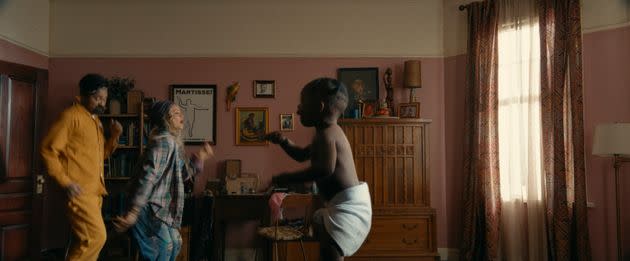
(From left): Carmen Ejogo and Mike Epps play the loving and protective parents of an unusual Black child in "I'm a Virgo."
Cootie’s mere appearance incites fear and morbid curiosity in others, particularly the white corporate establishment that is clearly often on Riley’s mind. And that fear is soon validated in the series.
But before Riley, Chun and their team of writers, including Tony award-winning playwright Michael R. Jackson, get to that, they begin with an intriguing narrative about how Cootie finds his way outside of his front yard fence and into the big, wide world.
He gains friends, like normies Jones (Tony nominee Kara Young) and Felix (“On My Block” star Brett Gray), who help him make the transition, putting aside their own awe. After all, Cootie is just like them; obsessed with comic books and curious about the world around him.
“I’m a Virgo” soars when it follows Cootie on his path of discoveries, including finding a like-minded oddball named Flora (Olivia Washington) to fall in love with, partaking in the pleasures of sex with her and making money from just being who he is.
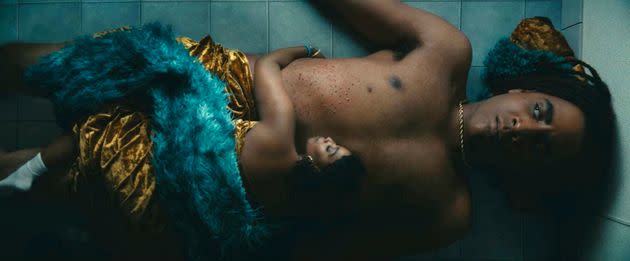
Scenes like when Cootie experiences love and sex for the first time help give "I'm a Virgo" its singular humor, curiosity and humanity.
It’s fun to watch all of these delightfully strange images populate the screen. It’s clear that the writers had a great time building out Cootie’s story, and it’s fascinating even to watch him inevitably experience the reality of his own exploitation. He’s almost immediately hired as a model, not because he’s good but because he’s different.
And Cootie doesn’t know any better to object. That’s not just true of this 13-foot Black guy but of so many young corporate stars.
Riley’s footprint is evident as the series exposes the perils of corporations, especially when it comes to Black bodies. The point is initially woven subtly into a narrative that builds across several early episodes, and because each episode hovers around the 25- or 30-minute mark, the story glides along smoothly.
But it’s when the writers begin to tack on unnecessary storylines that they undercut he potential of “I’m a Virgo.” The random death of one of Cootie’s friends, due to a lack of health insurance, sets off a series of events that completely convolutes the series.
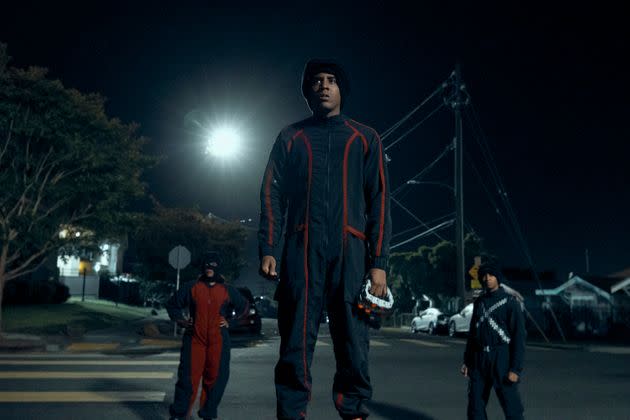
Cootie attempts to take on unjust corporate structures with his friends in "I'm a Virgo."
It’s comforting that the writers avoided the trope of sacrificing a young Black character through police brutality in order to propel the plot. But this death still didn’t really need to be there, since Cootie gains an understanding of how the system is profiteering off his unusual Black body with the help of his socially aware friends.
So, right around here is when the story spins off its axis. Cootie is inspired to rebel along with Jones and Felix, but without exactly knowing how. That all feels relatively realistic.
But here is also when a low-tier subplot featuring Cootie’s disappointing superhero idol, aptly referred to as Hero (“Justified” star Walton Goggins), is thrust into the main narrative with just a few precious episodes left, which frays the remainder of the season.
There’s something interesting to be said here about never meeting your idols, a lesson Cootie learns the hard way. But “I’m a Virgo” spends so much time building out Hero as — maybe? — a byproduct of a capitalist system that it stifles the far more interesting storylines with Jones and Felix that might paint a better picture of those hazardous influences.
Those two characters flail in the wind as Hero’s story expands in a way that only underscores his irrelevance.
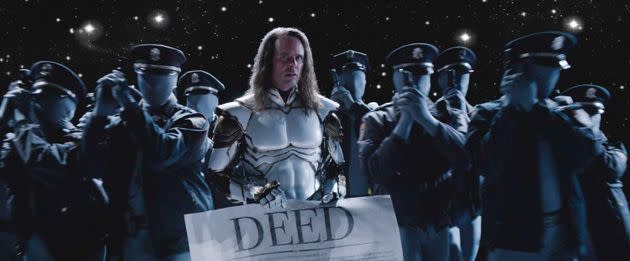
Right around here is when "I'm a Virgo" loses its own thread.
The idea that Hero might be an outgrowth of the system is only clear thanks to Riley’s comment in his Times interview: “I have a problem with superheroes in general, because, politically, superheroes are cops. Superheroes work with the government to uphold the law. And who do the laws work for?”
Fair enough. But there’s not enough time or space in “I’m a Virgo” to get a point like that across. It’s a seven-episode season that initially moves like a dream but ultimately would probably have been better as a 90-minute movie.
It’s a shame. Because at the core of “I’m a Virgo” is a satisfying coming-of-age story that, with some fine-tuning, could have been pretty excellent. The quirky humor and performances are there, and the whole creative team — including special effects — have helped build a captivating world.
If only it had all come together.
